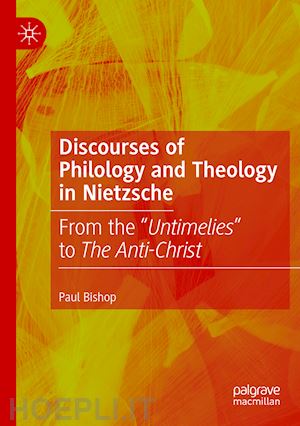

Questo prodotto usufruisce delle SPEDIZIONI GRATIS
selezionando l'opzione Corriere Veloce in fase di ordine.
Pagabile anche con Carta della cultura giovani e del merito, 18App Bonus Cultura e Carta del Docente
This study proposes to examine the tension in Nietzsche’s works between two competing discourses, i.e., the discourse of theology and the discourse of philology. It argues that, in order to understand Nietzsche’s complicated standpoint and the aim of his Kulturkritik, we have to appreciate how he operates with two different discourses, one indexed to belief, faith, liturgy (i.e., the discourse of theology) and another indexed to analytical reason, sceptical investigation, and logical argumentation, as well as historical context and linguistic precision (i.e., the discourse of philology). Its core thesis is that, in the end, Nietzsche can no longer believe, because he thinks he has uncovered a fraudulent production of meaning in the texts, in a way that is comparable with his insight into the production of morality in On the Genealogy of Morals (1887).











Il sito utilizza cookie ed altri strumenti di tracciamento che raccolgono informazioni dal dispositivo dell’utente. Oltre ai cookie tecnici ed analitici aggregati, strettamente necessari per il funzionamento di questo sito web, previo consenso dell’utente possono essere installati cookie di profilazione e marketing e cookie dei social media. Cliccando su “Accetto tutti i cookie” saranno attivate tutte le categorie di cookie. Per accettare solo deterninate categorie di cookie, cliccare invece su “Impostazioni cookie”. Chiudendo il banner o continuando a navigare saranno installati solo cookie tecnici. Per maggiori dettagli, consultare la Cookie Policy.